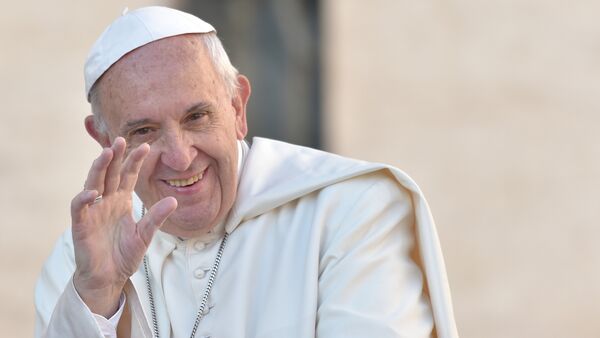In a transcript of a speech, the Pope stressed the need for young people to "reflect on [their] lives" and "direct them towards the future," comparing social media to televisual reality shows, "which are not real stories, but only moments passed before a television camera by characters living from day to day, without a greater plan."
"To have a past is not the same as to have a history. We can have plenty of memories, but how many of them are really part of our memory? How many are significant for our hearts and help to give meaning to our lives? In social media, we see young people appearing in any number of pictures, but we don't know how much of all this is really 'history,' an experience with purpose and meaning. Don't let yourselves be led astray by this false image of reality!" the statement said.
Do not underestimate the value of example, for it is more powerful than a thousand words, a thousand “likes”, retweets or YouTube videos.
— Pope Francis (@Pontifex) 23 February 2017
Instead of recording one's doings on social media, the Pope suggested teenagers focus on "life" and to reflect on "good times and challenges" they experience and encounter in a "spiritual journal."
Furthermore, the Pontiff cautioned Catholics to not let the Internet dilute the Church's message, saying the "hand of God" would guide them through "stormy" seas, and help overcome moments of difficulty.
"The genuine experience of the Church is not like a flash mob, where people agree to meet, do their thing, and then go their separate ways," Francis wrote.
Pope Francis, head of the world's largest Christian denomination, with around 1.3 billion followers globally, may well have been speaking with reference to recent studies about the impact of social media on the health of young users — some findings suggest overuse can lead to depression, delusion, bad eating habits, poor fitness, altered sleep patterns and more.
#sdshow Donegal couples selfie with the Pope Francis ….. pic.twitter.com/TUq60CevNf
— Caroline Orr (@OrrCaroline) February 23, 2017
Here comes another installment of #SelfieSunday with the skilled selfie master, Pope Francis! pic.twitter.com/DXwa2qWJsI
— Bridgeport Diocese (@Diobpt) February 26, 2017
. @the_popemobile love it @Snapchat @Pontifex #PopeInDC pic.twitter.com/cFlh0clnE7
— Vania D (@VaniaJ6) September 23, 2015
It is not the first time Pope Francis has urged teens to behave better — he warned against young people becoming "couch potatoes" at World Youth Day 2016. However, some may question whether Pope Francis is positioned to warn against the false images presented by social media, given the Vatican's liberal use of such platforms to disseminate a highly positive image of the Church.
I am beginning a new journey, on Instagram, to walk with you along the path of mercy and the tenderness of God.
— Pope Francis (@Pontifex) 19 March 2016
He has staked a reputation as a strongly social media friendly Pontiff, with official Facebook, Instagram, Snapchat, Twitter and YouTube accounts, and 10.5 million Twitter followers. When he visited the US in 2015, Snapchat launched a temporary "Pope Mobile" filter, and he frequently poses for "selfies" with fans.


